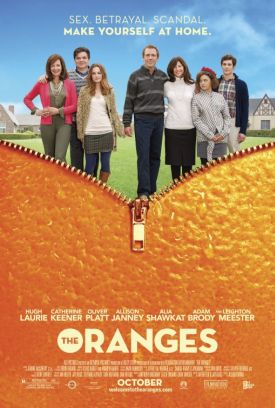 |
|
|
|||||||||||||||||||
Dysfunctional families have been mined for comedy before, of course, but mostly under the carapace of unreality that protects "The Simpsons" or the Bluths of "Arrested Development" from the heartbreak that real families endure when this kind of thing happens. And both Homer Simpson and George Bluth, for all their faults, do manage to keep their dysfunctional families more or less together. The Oranges, named after West Orange, New Jersey, where the two families live, has nothing to put up against the emotional devastation it portrays but some feeble therapeutic platitudes about doing what makes you happy. And, we are meant to understand, even if doing what makes you happy doesnít make you happy for very long, youíll be happier anyway for having done it ó and so will everybody else ó and broken up the home in which you used to be unhappy. Hereís Miss Meester as Nina trying out her best seduction line on Mr Laurieís David: "If you could lean across this table and kiss me and there were no rules, would you do it?" After some temporizing, David replies: "If there were no rules? Sure." "There are no rules," says Nina. "Wow!" says David. "You just blew my mind." Not really. That last bit is not really what David said, though his behavior suggests that it or something like it what he thought. Anyway, Ninaís an immature nincompoop. There are indeed, as everyone with a mental age greater than 15 understands, rules ó although admittedly Nina seems to have lived her life as if there were none that applied to her. Thatís no reason for David, let alone the audience, to fall for anything so absurd. Moreover, this supposed femme fatale seems to me, though others may differ, not very pretty, not sexy at all and so far short of mature womanhood that it is hard not to see David, though he is intended to be sympathetic, as less a victim of amour fou than a predator taking advantage of an emotional if not a chronological child. Ninaís relationship with her mother, played by Miss Janney is also that of a teenager, as she constantly acts out and defies her constantly interfering mother who tries unsuccessfully to rein her in and make her compliant by playing on apparently non-existent feelings of guilt. Guilt! Sheís going to show her something to be guilty about ó and then not feel guilty about it! David also makes a bid for sympathy by letting it be known he has been going through a rough patch with his wife, Paige (Miss Keener), but we are left in the dark as to the nature of their problem, apart from the fact that David doesnít like Paigeís obsession with leading her a capella singing group in Christmas carols. Is this a reason for him to be watching the Korean basketball league at two oíclock in the morning in his "man cave" when Nina, bored with the less than ardent attentions of his adult son, Toby (Adam Brody), now passed out from drinking too much, comes to seek him out and flirtatiously invites a kiss? The Christmas carols seem to betoken Paigeís deeper problem, whatever it may be, as once she moves out of the family home she abandons her singers to their own devices and instead finds fulfilment in a charity which gives goats to Third World families. I donít see how that justifies her in making a scapegoat of her own. It all comes down, as I say, to the Hollywood culture, which really is wedded to the therapeutic one, particularly in the absolute value it places on the quest for individual happiness and fulfilment and its Nina-like contempt for the rules by which people used to think themselves and their happiness were bound and limited. This merely hedonistic philosophy is occasionally dignified by reference to such fake Chinese proverbs as this: "Sometimes you have to burn your house down to see the moon." Uh, no. I donít think so. At no times do you have to burn your house down to see the moon. Doesnít happen. Ever. At one point when Paige scoffs at Davidís eminently scoffable-at claim that screwing his best friendís daughter makes him happy, he replies: "Címon, Paige, youíre not happy either." "Itís not about being happy," she tells him. "Then what is it about?" asks David. It is apparently meant to be a devastating reply. At any rate, Paige has no answer, though most people through most of our history would have been ready enough with the comeback that "it" is about being good. The guys who are supplying us with our popular entertainments not only donít believe that anymore, they seem to have forgotten that anyone ever did or ever could believe it. That tells you something about the state of the culture. [Top][Back] |
|||||||||
|
|||||||||||||||||||
|
|


